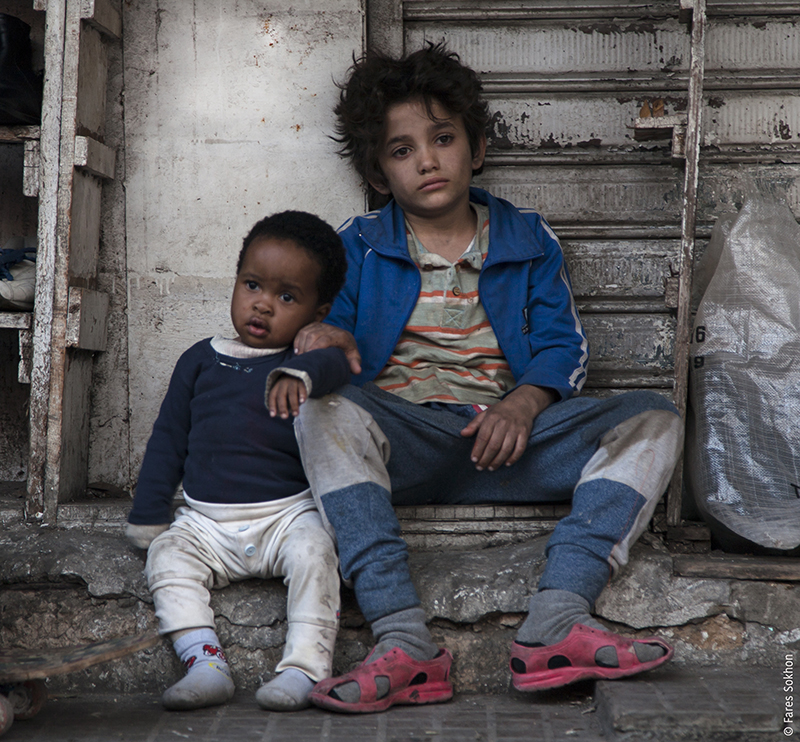Nadine Labaki loves watching kids on screen. “They make the most sense sometimes,” said the award-winning Lebanese director. “They haven’t been altered by hypocrisy, society’s codes and politics. It’s nurturing, in a way.”
She should know. She’s spent the past few years working with disenfranchised children in her country to craft her evocative third feature, “Capharnaüm” (sometimes written as Capernaum). Following the story of a boy who sues his parents for bringing him into the world, “Capharnaüm” is about isolation, injustice and endurance. It was an Oscar nominee for best foreign-language film.
Desperate but defiant, “Capharnaüm” reveals pockets of Beirut decimated by poverty. Shot low to the ground, the film shows cramped streets, shanty towns and market stalls from the perspective of pre-teen Zain (Zain Al Rafeea). After escaping a “home” plagued by violence and neglect, he’s taken in – for a time – by Rahil (Yordanos Shiferaw), an Ethiopian woman living illegally in Beirut with her baby Yonas (mesmerizing Boluwatife Treasure Bankole). Their makeshift family offers some respite in the wholly confronting story, eked out through disjointed timelines and surprising narrative devices.
FURTHER READING: Street Roots' continuing coverage of issues affecting immigrants and refugees
Making “Capharnaüm” changed Labaki as a person. By all accounts, it was equally transformative for the cast, too.
“We shot for six months, so they grew with me,” the director said. “Treasure almost made her first steps. Zain was 12 but he looked 8 because of malnutrition. He grew, took some weight; his voice changed.
“You get attached to them,” she said of the formidable, untrained youngsters. “They’re part of my family now.”
Remarkably true-to-life, “Capharnaüm” is a social realist film. Using techniques from documentary-making, these films cast ordinary people from the community represented and shoot in genuine locations, adding a palpable charge of authenticity on screen.
“We didn’t feel like we were shooting a film,” said Labaki (an actor herself, she plays Zain’s lawyer). “It was as if we were really observing those characters’ realities. All of them are non-actors, in almost the same situation in real life. You’re the vehicle for them to express themselves and their stories,” she says.
In 2015, Labaki was inspired – perhaps “incited” is more accurate – by the devastating image of Syrian toddler Alan Kurdî, who was found dead on a Turkish beach. As photos of Alan made global headlines, she wondered, if this child could talk, what would he tell the world?
For the next three years, she interviewed some of Beirut’s most vulnerable kids. They were “homeless, beaten up, abused, raped. Kids who’d ended up in jail or detention centres.” Labaki said they were “destroyed.” “Most use very harsh words to describe themselves: ‘I’m a dog. I’m an insect. I’m nothing.’”
She’d talk to them for a long time before asking if they were happy to be alive. The answer was mostly “no.”
“They’d say, ‘I wish I was dead,’” Labaki recalled. “A lot of them had tried to commit suicide. A lot would tell me, ‘Why am I here if nobody’s going to love me?’”
Al Rafeea was discovered among these kids. He was a Syrian refugee who couldn’t read or write, and his sorrowful eyes and searing performance spoke to years spent on the streets, in limbo. For most people, the heart-breaking weight of these human rights violations doesn’t bear thinking about.
“People just don’t want to deal with them,” Labaki said, frustrated. “Those kids pay the highest price for our bad decisions, our governments’ failing systems and wars. Even if it sounds naïve, I feel this responsibility to do something about it. I can’t stay silent anymore because, in a way, I am collaborating in this crime."
Upon premiering at Cannes last May, “Capharnaüm” received a 15-minute standing ovation and won the Jury Prize. Since then, it’s screened around the world, scoring awards in such diverse cities as São Paulo, St. Louis, Sarajevo, Calgary, Ghent and Melbourne. Despite cultural differences, audiences have the same reaction, Labaki said: They’re speechless, at least initially. Then they ask, “How can we do something?”
Labaki believes the film resonates universally because its concerns are pervasive across the globe.
“I’m talking about those belts of misery that surround our cities and societies. Those communities of invisible people who are struggling, who can’t eat when they’re hungry, who are immigrants and refugees. We’re all living the same problem.”
For decades, Lebanese activists have worked on this issue. Has “Capharnaüm” – named for a village near the Sea of Galilee where, it’s said, Jesus performed miracles – helped spur tangible change in Labaki’s home country?
“It’s definitely being talked about,” the director said. “I don’t know if it’s being talked about more, or if it’s being talked about enough.”
She’ll soon organize screenings for the government and organizations that advocate for children’s rights.
“The aim is to trigger discussion, then see how we can make real change on the ground,” she said. “I truly believe a film can change perspectives. I believe in the power of cinema.”
Courtesy of The Big Issue Australia / INSP.ngo
© 2019 Street Roots. All rights reserved. | To request permission to reuse content, email editor@streetroots.org or call 503-228-5657, ext. 404.
Street Roots is an award-winning, nonprofit, weekly newspaper focusing on economic, environmental and social justice issues. Our newspaper is sold in Portland, Oregon, by people experiencing homelessness and/or extreme poverty as means of earning an income with dignity. Learn more about Street Roots


